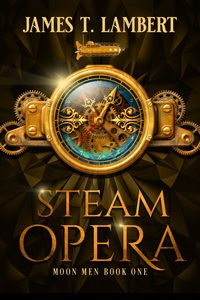 Steam Opera
Steam Opera
DETAILS: Series: Moon Men, Book One Publisher: Bert Books Publication Date: November 18, 2022 Format: Paperback Length: 416 pg. Read Date: July 8-12, 2024

What’s Steam Opera About?
I’m both tired and apt to meander too much when trying to answer this question, so I’m just going to lift the answer from Lambert’s website:
London, England, 1894
Patrick Smythe lives a comfortable life in London coming up with new inventions. His close friend Thomas Melton finances many of these ventures and together they advance technology. Geoffrey Trenton takes the occasional investigative work after retiring from Scotland Yard.
Airships fill the sky
The world is on the move with dirigibles and Zeppelins hauling freight and passengers. On land and sea people travel at will in an era of plenty.
Unbridled invention fills the laboratories
New discoveries fill the news as scientists probe past the boundaries of human knowledge. Every field advances as knowledge of the natural world drives new innovation.
Telescopes scan the heavens
The Royal Observatory at Greenwich has a new telescope and the astronomers are using it to view the universe. Even when they’ve been told to take the night off. A strange discovery and a brutal murder draws Trenton out of retirement to investigate.
And we want to go to the moon!
Patrick develops his most ambitious project: a trip to the moon and back! With Thomas’s help securing financing and Trenton running security, what could possibly go wrong? But a mysterious organization wants to prevent this and will go to any length to stop them!
My Big Complaint
The next section will touch on a maybe larger concern. Or maybe it’s a quirk. I’m not sure. But I had an easier time getting over it than this part. There’s a quick arc that introduces us to the future security chief for this endeavor—it starts out pretty interesting, maybe more interesting than the “go to the moon” story at that point. And just as that story gets your hooks into you…it’s dropped. I do think that I can see where and how Lambert is going to pick it up again in the future. But the way he abandoned the story in this novel was abrupt and off-putting.
Lambert is capable of better.
Um…Where’s all the Steam?
You call something Steam Opera, you set it in the latter 1800s in London, you make it about inventors and engineers (among others), you give it that color scheme and cover design—you sorta indicate to your reader that this is going to be a Steampunk novel.
But we really don’t get one—we get a lot of Zepplins and dirigibles, science that’s more advanced than it should be, and the rest of it is pretty era-appropriate. No gadgets, no science that’s hard to pull off on this side of the Industrial or Digital Revolutions. Sure, there are plenty of people wearing goggles—but that’s about it. This is the least Steam-punky Steampunk I think I’ve read.
And I know Lambert can pull off Steampunk gadgets—Aether Powered demonstrated that clearly. So why not here?
Really, why not?
So, what did I think about Steam Opera?
Okay—all I’ve really said after the description sounds negative, and I don’t want to sound that way. Because once you get past the above quibbles (which is really pretty easy), this is a perfectly entertaining read.
This is easily the most ambitious of Lambert’s first three novels, and his writing has improved over what his first books delivered (and I liked those I want to stress). His characters, prose, eye for detail, and imagination are better represented here (as is a capability to carry a story for another 100 pages or so than he has in the past). If he keeps improving like this, he should get the fanbase he deserves.
Lambert does a good job with the pacing—sometimes it seems he speeds up more than is advisable, and occasionally he swings the other way—but overall, he keeps things moving well enough to keep you engaged while dipping into some pretty technical areas (even if the technology is made up). It’d have been very easy for him to get so into the technical descriptions that he’d kill any momentum and turn this thing into a slog. All things considered, he made the right choices on that front.
And the technical bits themselves? I think Lambert really succeded there—both the way he adapted Zepplin-esque technology to mimic the work that the Atlas and other rockets did in our timeline and in the way he described their flight while still in Earth’s atmosphere—I bought it all. It seemed plausible enough for this world (moreso than, say, the music devices that The Ministry of Peculiar Occurrences enjoyed, for example)—particularly the in-flight moments.
I wouldn’t have minded some more named characters—and some female characters would’ve been good to see*. This is very much a book about Moon Men. However, the characters we did get were engaging and interesting (even the antagonists). The more time we spent with all of them, the more I wanted to spend time with them—which is always a good sign.
* The lack of female characters probably deserves its own section, I now realize—but what more is there to say? Yes, the Victorian-era was dominated by men in engineering and business, so it helps things ocme across as more realistic to not have women around. But if we’re going for that level of realism…maybe keep everyone on Earth?
What we learn in the closing pages and what leads up to them is came out of nowhere—or so it seems, but really didn’t. What’s better is it sets up the next book and satisfies your curiosity about “Why is this a Book One?” Sure, it creates a whole bunch of new curiosity about Book Two (and maybe beyond, I’m not sure how long Lambert is thinking), but that’s the point. As long as you give me some answers, you can add all the questions you want.
In short, I had plenty of fun with this book and this world, and am eager to return to it. As good as Lambert’s next release, Relics of War, looks—I can’t help but be irked that it’s not Moon Men Book Two. I really want to know where he’s going with this. But that’s a problem for future-H.C. Present-H.C. is happy to recommend this to you and strongly suggests you become familiar with the very pleasant experience that is reading a James T. Lambert novel.




